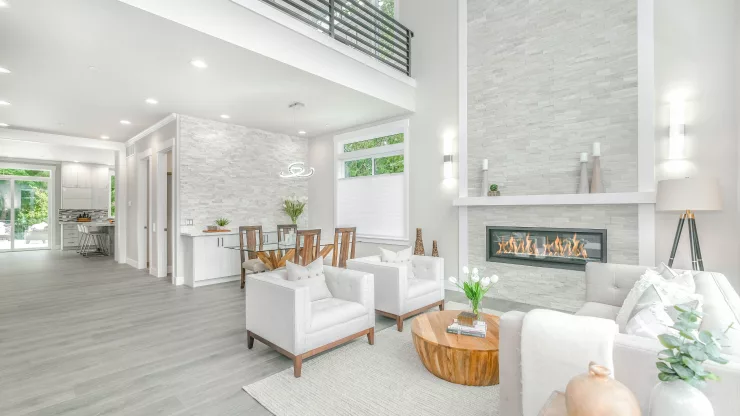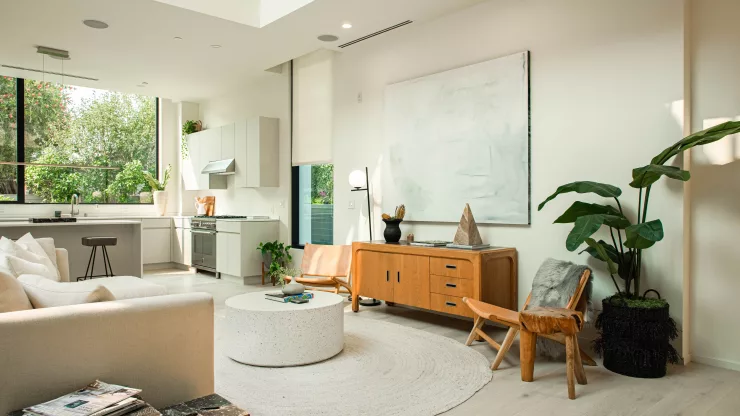Living alone can be both liberating and daunting. It is a significant transition that can be challenging, especially if you have never lived alone before.
However, it can also be an opportunity for personal growth and self-discovery.
In this article, we will explore the benefits of living alone, tips for making the most of your alone time, coping strategies for the transition, creating a home that suits your solo lifestyle, finding community as a solo dweller, and navigating the challenges of solo living.
Jump to Section
The Benefits of Living Alone
Living alone has several advantages, including:
- Independence: You have the freedom to make decisions and live life on your terms.
- Privacy: You can enjoy your own space and time without interruptions or distractions.
- Self-discovery: You have the opportunity to learn more about yourself, your likes, and dislikes.
- Creativity: You can decorate and organize your living space to reflect your personality and style.
- Responsibility: You develop a sense of responsibility and self-reliance as you manage your finances, household chores, and daily routine.
Embracing Solitude: Tips for Making the Most of Your Alone Time
Living alone does not mean being lonely. Here are some tips for embracing solitude and making the most of your alone time:
- Pursue your hobbies and interests: Use your free time to explore your passions and interests.
- Learn new skills: Take up a new hobby or learn a new skill that interests you.
- Connect with nature: Spend time outdoors, go for a walk, or take up gardening.
- Practice mindfulness: Practice meditation, yoga, or mindfulness to cultivate inner peace and calm.
- Socialize: Make time to connect with friends and family, or join a club or group that interests you.
Adjusting to Living Alone: Coping Strategies for the Transition
Adjusting to living alone can be challenging, but here are some coping strategies that can help:
- Create a routine: Establish a daily routine to help you stay organized and on track.
- Stay active: Exercise regularly to boost your mood and energy levels.
- Seek support: Reach out to friends and family for emotional support, or consider seeing a therapist.
- Practice self-care: Take care of your physical, mental, and emotional well-being by eating well, getting enough sleep, and practicing self-compassion.
- Be patient: Give yourself time to adjust to your new living situation.
Creating a Home that Suits Your Solo Lifestyle
When living alone, it is essential to create a living space that suits your needs and lifestyle. Here are some ideas to consider:
- Declutter: Get rid of unnecessary items and create a minimalist living space that feels calming and clutter-free.
- Personalize your space: Decorate your living space with items that reflect your personality and style.
- Invest in quality furniture: Invest in sturdy and comfortable furniture that will last for years.
- Maximize storage: Create storage solutions that maximize space and keep your living area organized.
- Make it cozy: Add comfortable blankets, pillows, and rugs to create a cozy and inviting atmosphere.
Building a Support System: Finding Community as a Solo Dweller
Living alone does not mean being isolated. Here are some ways to find community as a solo dweller:
- Join a club or group: Look for local clubs or groups that align with your interests and hobbies.
- Volunteer: Volunteer for a cause that you are passionate about and meet like-minded people.
- Attend events: Attend local events and festivals to meet new people and experience your community.
- Use technology: Use social media or online forums to connect with people who share similar interests.
- Connect with neighbors: Get to know your neighbors and participate in community events.
Thriving on Your Own: Navigating the Challenges of Solo Living
Living alone comes with its challenges, but here are some ways to navigate them:
- Loneliness: Combat loneliness by staying connected with friends and family, or consider getting a pet.
- Safety: Take precautions to ensure your safety, such as installing a security system and locking your doors and windows.
- Finances: Create a budget and stick to it to manage your finances effectively.
- Maintenance: Stay on top of household chores and maintenance to keep your living space clean and functional.
- Health: Take care of your physical and mental health by eating well, exercising regularly, and seeking medical care when necessary.
FAQ
How do I deal with feeling lonely when living alone?
Combat loneliness by staying connected with friends and family, or consider getting a pet. You can also join local clubs or groups that align with your interests and hobbies or volunteer for a cause that you are passionate about.
How do I manage my finances effectively when living alone?
Create a budget and stick to it. Track your expenses and prioritize your spending.
Consider setting up automatic payments for bills to avoid missing payments.
How can I make my living space feel cozy and inviting?
Add comfortable blankets, pillows, and rugs to create a cozy atmosphere. Personalize your space with items that reflect your personality and style.
Invest in quality furniture that is comfortable and functional.
Living alone can be a rewarding and fulfilling experience. It is an opportunity to discover more about yourself, cultivate independence, and build a life that suits your needs and desires.
By embracing solitude, staying connected with others, and taking care of your physical and mental health, you can thrive on your own and enjoy the benefits of solo living.

With a deep passion for personal development, Ben has dedicated his career to inspiring and guiding others on their journey towards self-improvement.
His love for learning and sharing knowledge about personal growth strategies, mindfulness, and goal-setting principles has led him to create My Virtual Life Coach.
Contact Ben at [email protected] for assistance.




